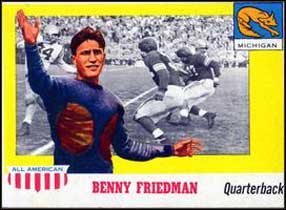As he got into his teens, he realed he wasn't going to be the world's strongest man when he saw other kids who were bigger than him. Instead, he decided to utilize his strength and speed to become a football player at East Tech in Cleveland. However, East High cut him saying he was too small at 5'8 and 170 lbs. He transferred to another school, Glenville High where he made the football team as well as the basketball and baseball team. In 1922, Benny beat his old team, East High in the regular season 31-0 and in the City championship 13-0 and National Championship against Oak Park, Illinois. In the classroom, he was ranked as top student, president of his senior class, and chosen to deliver the graduation commencement speech.
After graduating from Glenville in 1923, Benny decided to attend Michigan when Penn State said he was too small. With the help of his godfather and working at a Chinese restaurant, he paid his Michigan tuition. He developed his own strength training methods, squeezing tennis balls and using his hands only to slide across stair railings and armrests to become an effective passer. He still maintained his physique from his weight training as a youth and grew to be 5'10 and 175 Ibs. He became All-American in 1925 and 1926 as well as Big Ten MVP in 1926. Michigan won Big 10 tiles in '25 and '26 due to teammate, Benny Oosterbaan blocking and pass-catching abilities and Friedman's passing, kicking, and defensive abilities. After graduation, he turned professional due to his father's illness. He started with the Cleveland Bulldogs which folded in his first season of 1927 and the next year played for Detroit Wolverines.
Newspaper accounts say:
• Friedman led the league in rushing and passing in 1928.
• He threw 20 TD's in 1929 with the old rules and the old, blob ball (4 in one game).
• From 1927-1930, he threw over 50 TD's and passed over 5,663 yards as NFL leader.
New York Giants owner, Tim Mara, bought the whole Wolverine team and paid Friedman 10,000 a year to play for the Giants. He figured that with Friedman's talent, he could attract Jewish fans to come to the Polo Grounds (Giants home). In 1928, the Giants lost 54,000 dollars; 1929, the Giants made 8,500 dollars; 1930, the Giants made 23,000; and in 1931, the Giants made 34,000 dollars (Willard Manus in his article Passing Recognition). In 1932, Benny asked Mara if he can invest with the Giants, Mara said no, because he wanted to give it to his sons. Feeling slighted and exploited, Friedman left the Giants and played 3 more years for the football Brooklyn Dodgers. Throughout his playing days, his mom prayed for his safety by dropping 18 cents in a charity box before each of his games. The number eighteen stands for chai in Hebrew which means "life" according to this mother (Willard Manus, Passing Recognition).
 |
| With the Giants |
1. The football was simmered down from a blob ball to an oval shaped ball in 1933.
2. Passing rules changed where a passer doesn't have to stand five yards from scrimmage to throw.
3. Eliminating 2 incomplete passes as a five yard penalty and an incomplete pass to the end zone as change of possession.
 |
| As coach |
Elected to the College Hall of Fame 1951 and the NFL Hall of Fame 2005.
Copyright 2005 by Davan S. Mani as unpublished work

No comments:
Post a Comment